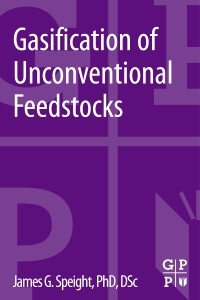Description
Gasification of Unconventional Feedstocks
Author: Speight James G.
Language: English
Subject for Gasification of Unconventional Feedstocks:
Approximative price 43.92 €
In Print (Delivery period: 14 days).
Add to cart162 p. · 15.2x22.8 cm · Paperback
Description
/li>Contents
/li>Biography
/li>Comment
/li>
World gasification capacity is expected to grow by more than 70% by 2015. While gasification is not a new process, the higher price in crude has lead operators and refineries to look at all possible coal-based technologies for energy conversion, and with the flow of heavy oil, tar sands and other unconventional feedstocks making their way to the refineries for processing, refinery managers and engineers alike must be made aware of how to process these uncommon energy sources. Gasification of Unconventional Feedstocks addresses these unfamiliar feeds and provides a quick and up-to-date reference on the background, process technology and downstream applications required to help refineries maximize profits turning low-value feedstock to beneficial syngas and other fuel products. Clear and comprehensive, Gasification of Unconventional Feedstocks provides engineers and refinery managers with the tools needed to quickly adapt to the more unconventional feedstocks and still maximize their refineries potential.
- Get up to speed on how to adjust your refinery's processing to unconventional feedstocks
- Understand the technology necessary to safely and effectively manage unfamiliar feeds
- Turn low-value product to profit quickly with must-have tips and rules of thumb
Chapter 1: Feedstocks
Chapter 2: Chemistry of Gasification
Chapter 3: Gasifiers for Gasification
Chapter 4: Applications
Chapter 5: Fischer Tropsch
References
Sources. He is recognized as a world leader in the areas of fuels characterization and development. Dr. Speight is also Adjunct Professor of Chemical and Fuels Engineering at the University of Utah.
James Speight is also a Consultant, Author and Lecturer on energy and environmental issues. He has a B.Sc. degree in Chemistry and a Ph.D. in Organic Chemistry, both from University of Manchester. James has worked for various corporations and research facilities including Exxon, Alberta Research Council and the University of Manchester. With more than 45 years of experience, he has authored more than 400 publications--including over 50 books--reports and presentations, taught more than 70 courses, and is the Editor on many journals including the Founding Editor of Petroleum Science and Technology.
- Get up to speed on how to adjust your refinery's processing to unconventional feedstocks
- Understand the technology necessary to safely and effectively manage unfamiliar feeds
- Turn low-value product to profit quickly with must-have tips and rules of thumb
These books may interest you

High Acid Crudes 43.92 €



